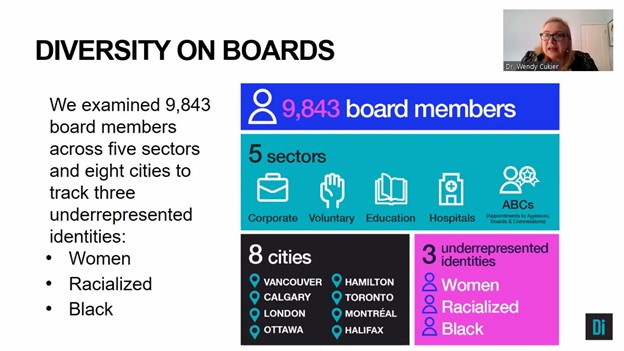Putting a Gender and Diversity Lens on Leadership and Entrepreneurship

The challenges women face in employment and entrepreneurship are not imagined or overblown. Research has repeatedly shown that systemic bias and structural barriers make it more difficult for women in Canada to advance in their careers or build successful businesses—especially women from marginalized communities.
WEKH Director Wendy Cukier recently joined the PEI Business Women’s Association Symposium to underline the value of diverse leadership, as well as the role women entrepreneurs play in our economy and communities.
Sponsored by WEKH alongside the Diversity Institute and BDC, the PEIBWA Symposium was a vibrant day-long conference filled with presentations, best practice and skill development workshops, and networking opportunities for women in business across the island and region.
Diversity in Leadership

Dr. Cukier began her presentation by sharing findings from Diversity Leads 2020—the largest Canadian study of board diversity assessing the representation of women, Black people and other racialized persons on boards of directors across Canada. The study finds that although the representation of women on boards in Canada is nearing parity, the situation for racialized people is far worse. While racialized people represent 23% of the population in the eight cities studied, only 10% of board directors analyzed were racialized.
The representation of women and racialized people also varies by sector. Women occupy 47.3% of all board positions in school boards, for instance, but just 25.3% of director seats in the corporate sector. While 14.6% of university and college leadership is racialized, only 4.5% of corporate board members are racialized. Among 1639 corporate board positions analyzed, only 13 individuals were Black (0.8%).
There are notable differences within sectors as well. 18.9% of corporate boards in Toronto have at least 40% women, while 5.4% have none. In Vancouver, where nearly half of the population is racialized, 12.8% of corporate boards have at least 20% racialized people while 71.0% have zero. In cities where women constitute half the population, as do racialized people, these numbers are incredibly telling.
“The research really reinforces the fact that this is not a question of talent, this is not a question of availability, this is very much a question of intentional strategies and practices in large organizations,” Dr. Cukier explained. “Boards are the tip of the pyramid. We need to work really hard to make sure that the people working at the bottom of the pyramid can see pathways to the top.”
The business case for diverse leadership is clear. By excluding women from boards, businesses risk ignoring the needs of half the population. As markets become increasingly diverse, the exclusion of racialized people has the same effect. Having diverse peoples in leadership roles can result in an organization’s ability to unlock new opportunities, better serve diverse consumers, and mitigate potentially significant legal and reputational risks.
Supporting Women Entrepreneurs
In Canada,15.6% of majority-owners of small- and medium-sized enterprises (SMEs) are women. Among self-employed Canadians, 37.4% are women—amounting to over a million business-owners. According to our research, that number continues to grow.
However, male entrepreneurs remain much more likely to receive angel investments and venture capital to fuel their businesses. Research that has been replicated in a number of different ways has shown that gender bias deeply informs investment decisions in their favour, often leaving women to finance their businesses with personal savings or credit. Women have been battered down by rejection and cultural stereotypes for so long that they have become “discouraged borrowers,” Dr. Cukier explained, and are less likely to seek growth financing than men are.
Women-owned businesses thus tend to be much smaller and less well-financed than those owned by men. They are also concentrated in the retail, services and accommodation sectors. Paired with the sharp increase of childcare and homeschooling needs, these factors make women-owned businesses and women entrepreneurs much more susceptible to the impacts of the pandemic. The impacts on entrepreneurs from marginalized communities, including Black and Indigenous individuals and persons with disabilities, have been even more acute.
In turn, it is essential that relief programs and recovery strategies identify and support the kinds of businesses women entrepreneurs lead if Canada is to build a more sustainable and inclusive economy post-COVID.
Dr. Cukier emphasized that WEKH is working to expose and challenge the structural barriers limiting women entrepreneurs by analyzing the entrepreneurship ecosystem through a gender and diversity lens. We find that the challenges women entrepreneurs face are complex, and require a systems approach to address at societal, organizational, and individual levels. Drawing on the expertise of a diverse network, WEKH is also highlighting the opportunities that women entrepreneurs may unlock by considering business avenues like incorporation and exporting, regardless of the size of their business.

Meagan Trush, Associate Director, Partnership Development & Stewardship at the Diversity Institute, participated in the Symposium as well and presented the WEKH/FWE: Sharing Platform. The free, bilingual Platform allowed women-identifying and non-binary entrepreneurs and the organizations that support them to easily connect in the immediate aftermath of the COVID-19 outbreak in Canada, and continues to foster fruitful connections between ecosystem members today.
Using the Platform is simple: Ask for what you or your business need, and Give what you may have to support others. Learn about how to get started.
